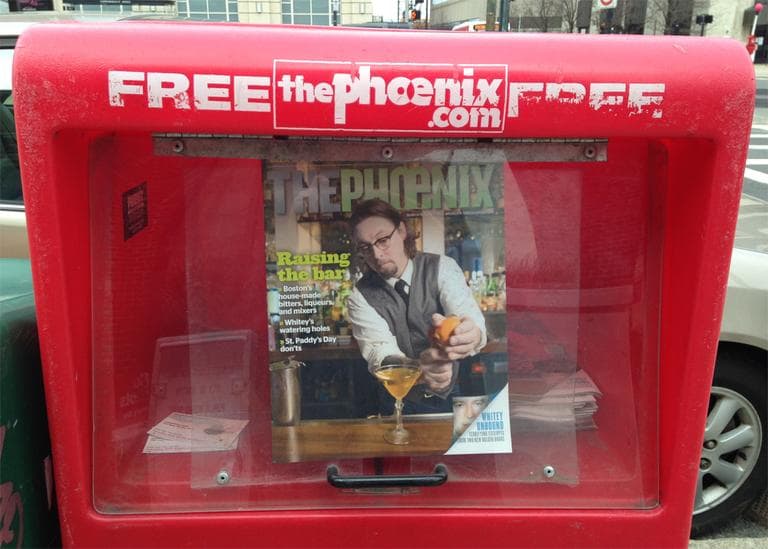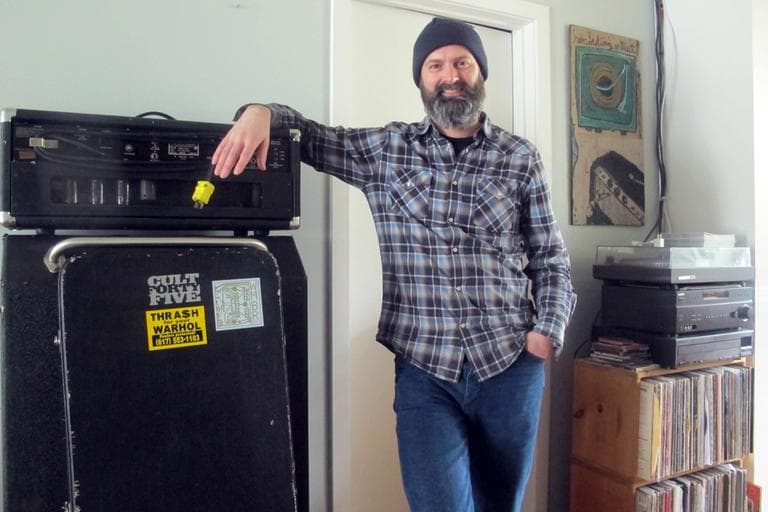Advertisement
'The Measuring Stick': Boston Music Scene Worries About Life After The Phoenix
Resume
The Boston Phoenix folded earlier this month after decades of publishing alternative political coverage, investigative pieces and insightful — often irreverent — cultural reviews. The weekly paper’s demise has the local music scene worried about the loss of a major platform and connector for their art.
Bob Maloney, a 43-year-old bassist, has been playing around Boston since he was a teen, most recently in the hard rock band Cult 45. For him, being mentioned in the Phoenix was the Holy Grail, and last January, Cult 45's new CD made it into its hallowed pages. The musician admits he was shocked when the alternative newsweekly announced it was shutting down.

"You look on every corner and there was a red Phoenix box. I mean, it really was the source," Maloney recalled. "Over the years there were a lot of zines, magazines and newspapers that would come and go, but the Phoenix was always there — it was the measuring stick. You know if you made it into the Phoenix people would pay attention."
In its last full month on the streets, the Phoenix highlighted the local band Kingsley Flood, but frontman Naseem Khuri says a turning point for his group was in 2010 when it was voted Best Roots Act in a Boston Phoenix poll.
"It said to us, you know, we're a part of this thing now, we're a part of this great Boston music scene and we know there's this support system underneath, which I think was led by the Phoenix," Khuri said.
The exposure gave Kingsley Flood a major boost, inspiring national attention. Khuri, who grew up in Westwood, said the paper’s coverage of bands like The Lemonheads and Morphine in the 1980s and '90s was formative as he was finding his musical feet in the suburbs.
"It also, to me, represented this other side of the city. And it represented total freedom of press. It was the idea that here’s a paper that can actually swear," he explained with a laugh. "And here’s one where they take their bands really seriously, and they treat music really seriously, and they are telling you that you should treat music seriously and you should consider this a vital part of the city."
Khuri is concerned about where new bands coming up today will find support and exposure. That's one reason why he wrote a lament on his band’s website about what the paper’s end means for the local music scene.
'A Loss Of Localism'
"It's such a changing landscape — journalism and media in general — that I don't really see who is going to step up. And there's a real loss of localism in all of this," said Joyce Linehan, a publicist for local arts organizations and a music industry veteran. She has booked clubs, managed bands and runs a record label in Boston.
"Blogs are great and Twitter is great and Facebook is great — and I spend a lot of time in all those places — but the information seems very scattered," she said.
"I just kind of miss the writers and the journalism, with the big personalities that were able to really put things in cultural and social and political context."
Publicist Joyce Linehan
And while smaller alternative publications like The Noise and DigBoston highlight bands and show listings, Linehan is worried about the loss of the type of comprehensive arts coverage the Phoenix was known for.
"I just kind of miss the writers and the journalism, with the big personalities that were able to really put things in cultural and social and political context — and I feel like that's slipping away," Linehan said.
Nate Albert, the original guitarist for the successful American ska-core band the Mighty Mighty Bosstones, feels the same way.
"I think the way they covered the scene felt much more personal and human," Albert said.
Back in the 1980s, when the Bosstones formed, Albert said Phoenix writers were deeply embedded in the local club scene. That position informed their features and reviews.
"They articulated these stories and revealed the stuff about us that we maybe didn't know or wouldn't really have thought of — and almost like mirrored back to us, 'Hey guys, this is what you could be,' " Albert recalled. Eventually the Bosstones went platinum in 1997 with their hit single “The Impression That I Get.”
Today Albert is vice president of artists and repertoire for Republic Records in New York. And, without too much remorse, he said that he now relies on streaming sites like Spotify and blogs to discover new music — not so much on radio, magazines or newspapers.
"I don't think that's something to mourn because I think that all of the people involved in the Phoenix will end up going on and doing great stuff," Albert predicted. "But I think that physical goods as we knew them are kind of moving into this different place — and I think that's kind of just OK."
Still, Albert said he's undeniably sad to see The Boston Phoenix go the way of other music media, like radio stations WFNX-FM and WBCN-FM.
Looking Ahead
Local concert booking agent Ryan Vogel mused that "whoever can figure out how to replace some of these older filters will become, I think, a millionaire."
Vangel, VP for talent booking at Crossroads Presents (a company owned by entertainment mogul Don Law), believes the important thing right now is replacing older media with "newer versions that people trust."

Vangel has trusted the Phoenix for two decades. He handles about 300 shows a year at local venues including the Orpheum, Brighton Music Hall and the Bank of American Pavilion. This means he's spent a lot of money on advertising concerts in the Phoenix. Now, Vangel said Crossroads will beef up its budget for digital and social media marketing.
While all of these players figure out their post-Phoenix strategies, local musician Bob Maloney is trying to remain hopeful.
"Maybe there's a silver lining somehow," Maloney said. "Maybe there's opportunity — a new venue for some of these writers and editors to really come together and rise from the ashes of the Phoenix."
It's clear that Maloney is not alone in his wish. The Boston Phoenix will be sorely missed by many of us, including this arts and culture reporter.
Correction: An earlier version of this report called DigBoston by its old name, The Weekly Dig. We regret the error.
This article was originally published on March 28, 2013.
This program aired on March 28, 2013.

